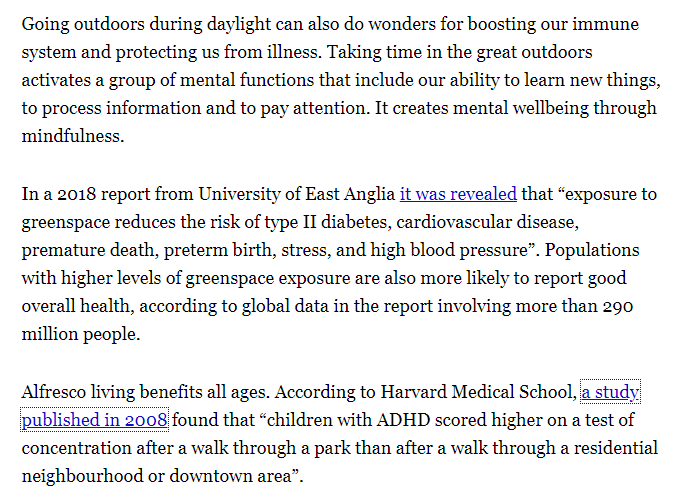This article nicely illustrates a common phenomenon in contemporary feature writing: the use of science that the author very probably hasn& #39;t read to provide factoids.
A short thread. /1 https://twitter.com/JamesMelville/status/1314806932872613889">https://twitter.com/JamesMelv...
A short thread. /1 https://twitter.com/JamesMelville/status/1314806932872613889">https://twitter.com/JamesMelv...
The factoids in this piece are mostly concentrated into these three paragraphs. Let& #39;s start with the first. Multiple claims with no evidence provided, but everything sounds great (boosting our immune system, mental wellbeing, mindfulness), so I guess we don& #39;t need citations. /2
The second paragraph contains a dead link (.html should be .htm). Once fixed, that goes not to a journal article, but to a Science Daily puff. I don& #39;t know if the HuffPo author read the article; my first impression is that the benefits of greenspace may be confounded with SES. /3
And it& #39;s not clear if the benefits of greenspace were associated with living near it, or with actually taking exercise in it. Certainly we can& #39;t claim that country walks are better than other exercise. The authors acknowledged their limitations, but Science Daily didn& #39;t. /4
The third paragraph again links, not to a study, but to a "Harvard Health Letter" https://www.health.harvard.edu/newsletter_article/a-prescription-for-better-health-go-alfresco
With">https://www.health.harvard.edu/newslette... the authority of "Harvard Medical School", it mentions "a study from 2008". /5
With">https://www.health.harvard.edu/newslette... the authority of "Harvard Medical School", it mentions "a study from 2008". /5
One would expect the Harvard Health Letter, from the prestigious Harvard Health Publishing, part of the prestigious Harvard Medical School at the prestigious Harvard University, to be a paragon of scientific rigour. But it doesn& #39;t even contain a link to the study. ¯\_(ツ)_/¯ /6
Some googling suggests that this is the study: https://journals.sagepub.com/doi/10.1177/1087054708323000
It">https://journals.sagepub.com/doi/10.11... has a sample size of 17.
Again, I& #39;m not sure that I would bet money that the author of the HuffPo piece actually read it before citing it. /7
It">https://journals.sagepub.com/doi/10.11... has a sample size of 17.
Again, I& #39;m not sure that I would bet money that the author of the HuffPo piece actually read it before citing it. /7
But even if he did, look what he quoted (emphasis added by me): "**children with ADHD** scored higher on a test of concentration after a walk through a park than after a walk through a residential neighbourhood or downtown area" /8
That doesn& #39;t tell us anything about people other than children with ADHD. It probably shouldn& #39;t be used to claim benefits for walking in green spaces for the rest of the population. /9
There& #39;s nothing especially unusual or objectionable about the HuffPo piece. (I have other quibbles with it, but they& #39;re not relevant here.) It& #39;s entirely typical of the genre. You can find a dozen articles using these techniques every day. /10
My bigger problem is authors of this kind of feature using throwaway quotes from science that they haven& #39;t read (or had explained to them) as a source of feel-good support for their articles. (It also works equally well for feel-bad information.) /11

 Read on Twitter
Read on Twitter


